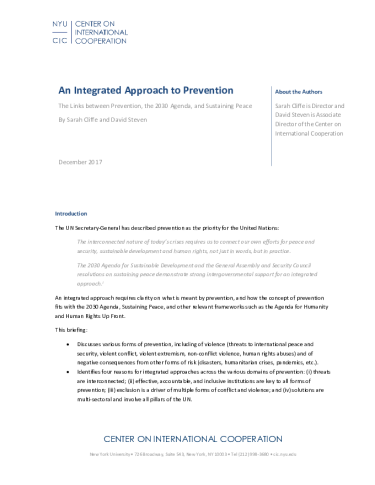An integrated approach to crisis and conflict prevention requires clarity on what is meant by prevention, and how the concept of prevention fits with the 2030 Agenda, sustaining peace, and other relevant frameworks such as the Agenda for Humanity and Human Rights Up Front.
This briefing:
- Discusses various forms of prevention, including of violence (threats to international peace and security, violent conflict, violent extremism, non-conflict violence, human rights abuses) and of negative consequences from other forms of risk (disasters, humanitarian crises, pandemics, etc.).
- Identifies four reasons for integrated approaches across the various domains of prevention: (i) threats are interconnected; (ii) effective, accountable, and inclusive institutions are key to all forms of prevention; (iii) exclusion is a driver of multiple forms of conflict and violence; and (iv) solutions are multi-sectoral and involve all pillars of the UN.
- Underlines that an integrated approach does not mean removing all distinctions between the different forms of prevention, given that: (i) many root causes and risk factors are similar, others are different; (ii) responsibilities and comparative advantages vary across the international system; and (iii) prevention must be focused to be effective.
- Proposes a new paradigm for prevention that has three levels: (i) universal prevention strategies that aim to build healthy societies that manage conflict productively, provide safety and security, increase resilience, and enhance social, political, and economic inclusion; (ii) “at risk” prevention strategies that target groups, communities, and countries that face elevated risk of conflict, or where violence is highest and resilience lowest; and (iii) prevention strategies that are tailored to situations of ongoing conflict or crisis.
- Argues that the 2030 Agenda and the Universal Declaration of Human Rights provide frameworks for universal approaches to prevention and also standards for measuring the outcomes of effective prevention, while the sustaining peace resolutions provide a framework for targeted approaches to prevention when the risk of violent conflict is high. Other frameworks (the Plan of Action to Prevent Violent Extremism, the Sendai Framework, the New Agenda for Humanity) cover specific threats and forms of prevention.
- Identifies operational questions that will need to be addressed as the United Nations system responds to the challenge from the Secretary-General that it should act as a platform for integrated and effective prevention.


